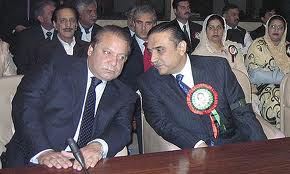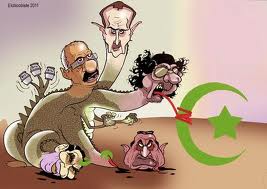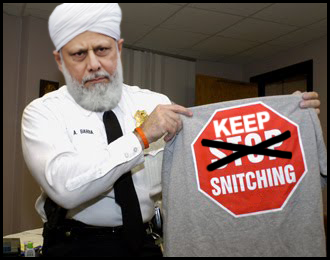The Taliban and tobacco
By Aamir Latif and Kate Willson June 29, 2009, 10:15 am
http://www.icij.org/project/tobacco-underground/taliban-and-tobacco
Tumman Khan is a poor, aging farmer who tills another man’s land in the restive northern tribal belt of Pakistan. For him and others in the Khyber Agency region, Sahib Ayub Afridi is considered an angel. The illiterate 70-year-old tribal leader finances construction of water pumps, streets and lighting, builds mosques and madrasahs, and supports the penniless and widowed.
But there’s another side to Afridi.
A one-time notorious drug kingpin who in the 1980s armed the Afghan Mujahidin at the CIA’s behest, Afridi churns out millions of counterfeit cigarettes to smuggle across central Asia, China, and Africa, and splits the proceeds with the pro-Taliban militants who control the swath of mountainous borderland, according to Pakistani intelligence and customs officials. The leaders of some of these militant groups are on the U.S. most-wanted list in the region — among them, Baitullah Mehsud, who has claimed responsibility for bloody attacks in Pakistan and has sworn to strike Washington, D.C. U.S. officials have responded by putting a $5 million price on Mehsud’s head.
A tax for terrorism
As government sanctions restrict traditional sources of terrorist financing, Pakistani militant groups increasingly rely on proceeds from counterfeit cigarette production and smuggling, intelligence sources say. Although income figures are rough estimates at best, profits from the illicit cigarette trade account for as much as 20 percent of funding for these militant groups, second only to heroin production, according to terrorism experts in Pakistan. “Taliban and other militant groups do not have to do much,” says Ikram Sehgal, a senior defense and security analyst who heads SMS Security, Pakistan’s leading private security company. “They simply receive taxes on a regular basis from owners of illegal and legal cigarette factories and later for the safe passage they provide to the convoys.”
Sahib Ayub Afridi: top cigarette counterfeiter in Pakistan.
The Afridi case is part of a broader trend of terrorism groups relying on contraband to finance their activities, experts say. Even if efforts to cut the region’s booming heroin production are successful — an unlikely prospect — the lucrative tobacco trade suggests how hard it will be to stanch funding to terrorists and insurgents in areas far from government control. The world’s longest-running civil wars are fueled by contraband according to a 2002 study by Stanford University’s James Fearon. Cocaine smuggling has largely propelled FARC’s 40-year insurgency in Colombia. Diamonds have funded civil wars in Sierra Leone and Angola. Opium has led to drawn-out conflicts in Afghanistan and Burma.
In the badlands of the Afghan-Pakistan border, the challenges are particularly daunting. U.S. President Barack Obama recently deemed the region “the most dangerous place in the world” for Americans. The growing power of the Taliban and other militant groups, combined with new waves of terrorism, has put Pakistan’s weak government on the defensive. The risks are indeed high: as much as two-thirds of the nuclear-armed country is ruled not by a central government but by insurgents, militants, tribal leaders, or warlords.
Overlooked in the Pakistani Taliban’s growing power is the role of tobacco smuggling.
As U.S. and NATO forces attacked the Taliban in Afghanistan, the predominantly Pashtun fighters increasingly sought sanctuary along the ungoverned border of Pakistan. The Khyber Agency — a border province boasting the most-traveled trade route between the two countries — is also the hotbed of cigarette counterfeiting in Pakistan. And its renegade factories have become the region’s largest employer, according to Pakistani intelligence sources.
Fateh Mohammed, a senior Pakistani tax official, said counterfeit cigarette production is on the rise, costing the government an estimated $88 million annually in lost taxes. He said the excise department does what it can, but the factories are “out of reach.”
“It’s hard for us to curb the sale and production of counterfeit cigarettes as we neither have the manpower and other resources to do that,” Mohammed said. “Nor do we have any reach to the tribal belt where this business is flourishing.”
Illicit cigarette production in the strife-torn tribal belt, a semiautonomous region of Pashtun tribes bordering Afghanistan, accounts for an estimated 22 percent of all consumption in Pakistan, a country with cigarette taxes among the highest in the world — accounting for 87 percent of the cost per pack. Mohammad Khosa, who heads the anti-counterfeiting efforts for British American Tobacco in the region, estimated that the region’s factories pump out some 15 billion cigarettes a year, a large portion of which end up smuggled to neighboring Afghanistan.
Click to enlarge
“Smuggling has long existed because of physical proximity to land routes going into Central Asia and beyond,” said Sumit Ganguly, professor and Pakistan expert at Indiana University. “On top of that, there are very poor people. The two dovetail very neatly.”
Trade routes between Afghanistan and Pakistan developed over thousands of years with no governmental controls. It wasn’t until the British drew a 1600-mile border between the two countries, in 1893, that a culture of illicit trade flourished. Today, Pashtuns pay little attention to the poorly marked borders that separate the rugged terrain between Afghanistan and Pakistan.
Following the October 2001, U.S.-led invasion of Afghanistan, smuggling contraband goods across to Pakistan provided the Taliban with a major source of financing. In his final story published in The Wall Street Journal before his January 2002 abduction, Daniel Pearl reported on how the group “taxed” goods being smuggled across the border. The militants skimmed between $35 million and $75 million off exports of Marlboro cigarettes, Sony TVs, and Gillette shaving cream, Pearl wrote.
Today, no figure is more deeply mired in the region’s contraband trade than Haji Ayub Afridi, a tribal leader of the region-ruling Afridi clan, which has long controlled trade routes into Afghanistan and whose name is synonymous with trade and transport throughout Pakistan.
Who’s Who of militants
Afridi’s sweeping luxury estate near the Afghan border is enclosed by 20-foot high walls topped with concertina wire, guarded by a private army and protected by an anti-aircraft battery. Authorities point to a pair of lucrative, yet nameless, cigarette factories that Afridi owns, known locally as “One More Cigarette,” and to a number of cigarette-filled warehouses he is said to own near Peshawar — the region’s largest city, 25 miles east of his home. Because most of his business is in the names of associates, the full extent of Afridi’s assets is unknown, but officials believe he operates as many as six factories.
Afridi churns out copies of an array of Western brands — Marlboros, Camels, Benson & Hedges, and 555s, among them, officials say. The Marlboros and Camels are smuggled into Afghanistan and the central Asian countries of Turkmenistan, Uzbekistan and Tajikistan. Benson & Hedges is favored for shipment to South Africa, while counterfeit 555s are moved through the Khunjarab pass into China. Afridi also produces low-quality local brands One-Touch and Datchi, which are popular in Afghanistan.
Tobacco counterfeiter Afridi lives in a heavily guarded compound near the Afghan border.
Afridi pays protection money to a Who’s Who of the region’s militant leaders, according to Pakistani intelligence. In exchange for operating his factories in the Khyber Agency, sources say, Afridi pays $36,000 a month — the average combined annual income of 47 Pakistanis — to Mangal Bagh, leader of the area’s ruling pro-Taliban militia.
A former bus token taker and fellow member of the Afridi clan, warlord Bagh commands thousands of heavily-armed Islamist militants through his group Lashkar-i-Islam (Army of Islam). In addition to collecting taxes from the likes of Afridi, the pro-Taliban group specializes in kidnapping for ransom. Early in his smuggling racket, Afridi refused to cut Bagh a percentage of his proceeds, instead paying protection taxes to a rival Taliban group, officials say. The two groups clashed in 2008, leaving 19 dead. Following the battle, Afridi agreed to pay Bagh.
Bagh may be the most moderate militant leader on Afridi’s payoff list. Afridi also pays a pair of rival Taliban factions in the neighboring tribal region of Waziristan, along the Afghan border to the south, who are actively fighting U.S. and NATO troops in Afghanistan. One of the men, Mullah Nazir, opposes fighting against Pakistan security forces. But his rival, Baitullah Mehsud — leader of Pakistan’s Taliban movement — has advocated attacks against the Pakistani government and is blamed by Islamabad for ordering the assassination of Benazir Bhutto.
Mehsud’s troops also provide a safe haven for al-Qaeda forces fighting in Afghanistan, and his militancy has made him a prime target for the Americans. But that has not deterred the Taliban leader; he recently joined forces with Nazir and a third warlord who, together, now control much of the region. The rival groups agreed to “fight the U.S. together, because we are concerned over the surge in American troops in Afghanistan,” Nazir told local tribal chiefs, according to the Daily Times, an English-language newspaper in the region.
Afridi isn’t the only counterfeit cigarette producer in the tribal belt. Smugglers also transport cigarettes from illegal factories in neighboring provinces of Kohat and Bannu into Afghanistan through the border town of Miramshah. The area is in the grip of an al-Qaeda militia of ethnic Uzbeks loyal to Mehsud. Pakistani intelligence sources say cigarette smugglers pay the militant groups up to 20 percent commission for each convoy. American and Japanese model trucks leave the sprawling, high-walls cigarette factories almost daily, while bigger convoys of five to seven trucks leave twice a week, local residents say.
On the lam
Afridi is no stranger to the black market. During the 1960s he drove truckloads of smuggled gold through the Khyber Pass. His partner was a slightly older gold smuggler named Iqbal Baig. The two prominent tribal members would remain close business partners as they expanded into currency, hashish, and heroin smuggling.
The Torkham Crossing, a heavily traveled trade route between Pakistan and Afghanistan.
In the 1980s, Afridi is credited with orchestrating the heroin trade between eastern Afghanistan, through the Khyber Pass, to the Afridi clan in Pakistan. Pakistani and Belgian authorities first sought his arrest in 1983, after tying the smuggler to 17 tons of hashish in a southwest Pakistan warehouse and another 6.5 tons in Antwerp, Belgium. But when 50 Pakistani police sought to arrest Afridi in 1990, they were met by an armed militia and quickly retreated, according to U.S. court records.
Despite his record as a narcotics trafficker, the CIA had its own uses for Afridi. In the 1980s, he was one of many Pashtun tribal leaders tapped by the agency to help finance and arm the Mujahidin struggle against the Soviet invasion of Afghanistan, according to The New Dimension of International Terrorism by former Harvard University fellow and U.S. Army Colonel Stefan M. Aubrey. After the Soviets pulled out of Afghanistan, Afridi turned his attention homeward. He was elected to Parliament in 1990 — reportedly after paying up to $600 per vote to represent the Federally Administered Tribal Areas.
Through it all, Afridi never stopped dealing drugs, according to U.S. court records. He ordered subordinates to truck hashish to Karachi in Bedford trucks and old tanker trucks. Meanwhile, he and his partners made millions smuggling tons of heroin and hashish across the globe — through India to London, Paris, and Amsterdam, packed amid frozen fish into the Netherlands, through Singapore and Hong Kong, and across the Atlantic to the United States and Canada.
Afridi, through his longstanding contacts in the drug world, became the key supplier to the biggest narcotics ring in Pakistan, according to the U.S. Drug Enforcement Administration. The DEA branded Afridi’s syndicate “the single most prolific heroin and hashish drug trafficking organization in Pakistan.” The amounts were indeed impressive: 57 tons of hashish into the Netherlands in a single shipment; 30 tons of hashish to California; and massive amounts of heroin around the world.
At the center of the operation was the notorious Iqbal Baig–a respected, well-known businessman whose assets included cinemas, textile factories, commercial property, and a pizzeria. And at Baig’s side was Tarik Butt, his brother-in-law. Butt took over a battery manufacturing plant in 1986 after its owner — smuggling heroin into Vienna on Butt’s behalf — died from a drug-filled balloon exploding in his stomach. The factory became “a social club of misfits, thugs, murderers and dope dealers,” said a New Delhi-based agent with the Drug Enforcement Administration.
By the 1990s, however, Afridi’s criminal past was catching up with him. With authorities threatening prosecution, he went into hiding and was soon splitting his time between Pakistani tribal areas, Afghanistan, and the United Arab Emirates.
It was a trio of hash shipments — 58 tons in all — that finally led to Afridi’s undoing.
Children line up with lunch buckets at a refugee camp near Swabi, Pakistan, during spring 2009 fighting in the Swat valley.
Hidden amid fish, tires and sacks of rice, the drugs were sent to Long Island, New York, and Newport News, Virginia, and led to the arrest of one Stewart Newton, Afridi’s U.S. connection. Arrested in 1988, Newton was sentenced to 47 years in prison, but served only eight after agreeing to cooperate with prosecutors in the case against the Pakistani smugglers. Also indicted were Butt and Baig, whom Pakistan extradited to the United States in 1995.
Afridi stayed out of reach, hiding in the tribal zone. But fearful of arrest by Pakistani officials and concerned his now-arrested co-conspirators would turn against him, he negotiated with the DEA for a year before finally turning himself in.
Now-retired DEA agent Gregory D. Lee recalls fielding odd questions from Afridi’s go-between during that time.
“He would ask crazy questions like, ‘how many times a day will I be beaten by the Marshals?’ and ‘will I be able to stay at the Waldorf Astoria in Manhattan,” Lee said during a recent phone interview. If he wasn’t permitted to serve out his sentence at the four-star hotel, Afridi wanted to know if he could employ a personal cook at the prison. “He had no idea what to expect.”
In 1997, Afridi pleaded guilty to smuggling hashish and was sentenced to five years in prison and a $100,000 fine. But the Pakistani godfather served only two years in U.S. jail, paid just $425, and in 1999 he was deported to Pakistan, where officials promptly arrested him for an earlier smuggling case.
Although sentenced in Pakistan to seven years in prison, Afridi was released without explanation shortly after 9/11. Soon after his release, he traveled to Afghanistan to unite anti-Taliban warlords, according to senior Pakistani intelligence and anti-narcotics officials. His attempts failed, they say, and the aging Afridi returned home.
It is back home, in the Khyber Agency, where Ayub Afridi has refocused his attentions. Gone are the hashish and heroin shipments, officials say. The old smuggler has found an easier racket to ply, with few penalties and easy profits — the untaxed cigarette trade. Reached by telephone, in English and Urdu, an elderly man at Afridi’s home denied he was Afridi and declined to comment further.
Nor will others talk openly about Afridi in his native land. Journalists do not write about the man, and even law enforcement officials speak about him in hushed tones. But the poor of the Khyber Agency are not so reticent. Despite his years in Afghanistan, in jails and throughout his smuggling exploits, Afridi didn’t forget the poor who surrounded him, farmer Tumman Khan told a visiting reporter. Even when Afridi was locked away in an American prison cell, the poor and widowed continued to receive monthly checks on his behalf.
“Haji Sahib is an angel for poor people like us,” Khan said. “We don’t know much about his business, whether legal or illegal. What we know is that he has helped us when no one was there to do that.”
 In yet another ironic twist, our civilian, democratically elected government passed the act even though it was a vestige of Gen Pervez Musharraf’s regime and encapsulated his increasingly authoritative attitude towards press freedom.
In yet another ironic twist, our civilian, democratically elected government passed the act even though it was a vestige of Gen Pervez Musharraf’s regime and encapsulated his increasingly authoritative attitude towards press freedom. After all, individuals who go online are more vulnerable to censorship than professional media personnel because they do not have the backing of organisations or unions, nor do they have adequate resources such as money, lawyers or awareness about their right to free speech.
After all, individuals who go online are more vulnerable to censorship than professional media personnel because they do not have the backing of organisations or unions, nor do they have adequate resources such as money, lawyers or awareness about their right to free speech.





